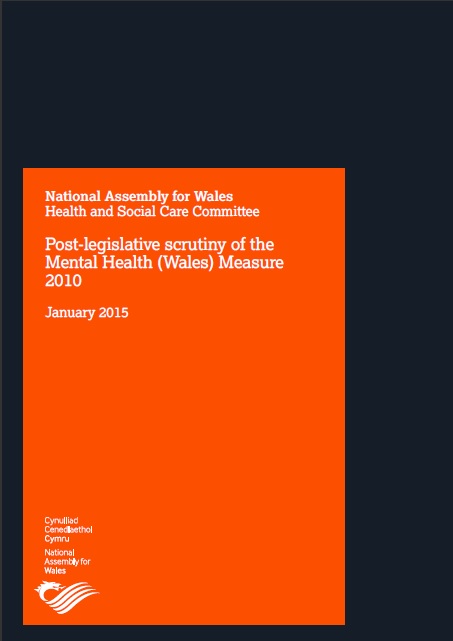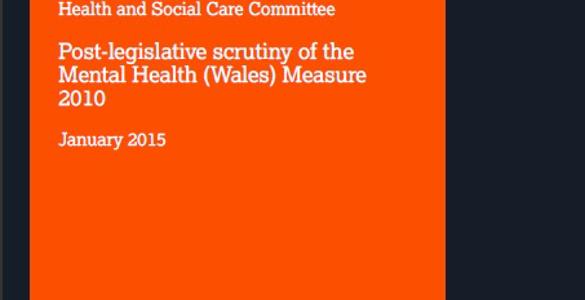Article by Stephen Boyce, National Assembly for Wales Research Service
 Today the Assembly is debating a report by its Health and Social Care Committee on the Mental Health (Wales) Measure 2010. The report sets out the findings of the Committee on the impact of the Measure. The Measure was welcomed as a positive development in mental health care when it was passed by the Assembly in 2010 as it seeks to ensure that people experiencing mental illness can gain earlier and easier access to treatment and support before their symptoms become more serious. It aims to do this by providing better mental health services in primary care and better care planning and support for people in secondary mental health services. It also increases the involvement of service users in their care and treatment and widens access to independent mental health advocacy. The Committee wanted to know whether the Measure is achieving what was intended. Last summer it requested written evidence from mental health service providers, voluntary organisations and others. It also invited the Minister for Health and Social Services, Mark Drakeford AM, to give evidence at its meeting on 20 November 2014. The Committee’s task was aided by the inclusion in the Measure of a requirement on the Welsh Government to review the effectiveness of the Measure within four years of implementation. The Welsh Government published an interim review of the Measure in spring 2014 and is planning a final report by January 2016. The Committee found that access to mental health care and support in primary care has improved overall; more people are now seeking help with mental health difficulties. However, the demand for treatment, especially talking therapies, can mean long waiting times in some areas. The Committee heard that care and treatment plans are now provided for more people in secondary care than before but that their quality is variable. There was evidence that the provisions in the Measure to allow former patients to re-access treatment if they become unwell is poorly understood by some staff and patients. More people are now receiving the support of an independent advocate than before, although there is a need to improve knowledge and awareness amongst staff to enable them to help patients gain access to advocacy. When he gave evidence to the Committee, the Minister outlined his plans to address these issues, which include setting up task and finish groups to review each of the four parts of the Measure and an action plan for psychological therapies. The issue of greatest concern to the Committee was that children and young people, who were brought within the scope of the Measure at a relatively late stage, are not benefitting fully from it. The evidence suggests that the new and improved services have been designed around adult services which are not always best suited to meeting the needs of children and young people. The Minister has announced a review of Child and Adolescent Mental Health Services (CAMHS) to address these and other issues, including those highlighted by the Children, Young People and Education Committee in its November 2014 report on CAMHS. The Committee also looked at the financial aspects of the Measure in terms of whether the original cost estimates were realistic and whether the levels of funding are sufficient to achieve its aims. There was little evidence on which to base firm conclusions but the Committee heard that a properly implemented Measure should produce long term savings as earlier treatment reduces the need for services later. In its report the Committee emphasised the need for robust cost benefit analysis to assess the value of the Measure. Post-legislative scrutiny is a relatively new area of work for the Assembly. The lessons learned from the Mental Health (Wales) Measure 2010 will help to inform best practice in the making and implementation of future legislation. The Committee made 10 recommendations. Its report, the evidence it received, and the Minister’s response to the report can be read here.
Today the Assembly is debating a report by its Health and Social Care Committee on the Mental Health (Wales) Measure 2010. The report sets out the findings of the Committee on the impact of the Measure. The Measure was welcomed as a positive development in mental health care when it was passed by the Assembly in 2010 as it seeks to ensure that people experiencing mental illness can gain earlier and easier access to treatment and support before their symptoms become more serious. It aims to do this by providing better mental health services in primary care and better care planning and support for people in secondary mental health services. It also increases the involvement of service users in their care and treatment and widens access to independent mental health advocacy. The Committee wanted to know whether the Measure is achieving what was intended. Last summer it requested written evidence from mental health service providers, voluntary organisations and others. It also invited the Minister for Health and Social Services, Mark Drakeford AM, to give evidence at its meeting on 20 November 2014. The Committee’s task was aided by the inclusion in the Measure of a requirement on the Welsh Government to review the effectiveness of the Measure within four years of implementation. The Welsh Government published an interim review of the Measure in spring 2014 and is planning a final report by January 2016. The Committee found that access to mental health care and support in primary care has improved overall; more people are now seeking help with mental health difficulties. However, the demand for treatment, especially talking therapies, can mean long waiting times in some areas. The Committee heard that care and treatment plans are now provided for more people in secondary care than before but that their quality is variable. There was evidence that the provisions in the Measure to allow former patients to re-access treatment if they become unwell is poorly understood by some staff and patients. More people are now receiving the support of an independent advocate than before, although there is a need to improve knowledge and awareness amongst staff to enable them to help patients gain access to advocacy. When he gave evidence to the Committee, the Minister outlined his plans to address these issues, which include setting up task and finish groups to review each of the four parts of the Measure and an action plan for psychological therapies. The issue of greatest concern to the Committee was that children and young people, who were brought within the scope of the Measure at a relatively late stage, are not benefitting fully from it. The evidence suggests that the new and improved services have been designed around adult services which are not always best suited to meeting the needs of children and young people. The Minister has announced a review of Child and Adolescent Mental Health Services (CAMHS) to address these and other issues, including those highlighted by the Children, Young People and Education Committee in its November 2014 report on CAMHS. The Committee also looked at the financial aspects of the Measure in terms of whether the original cost estimates were realistic and whether the levels of funding are sufficient to achieve its aims. There was little evidence on which to base firm conclusions but the Committee heard that a properly implemented Measure should produce long term savings as earlier treatment reduces the need for services later. In its report the Committee emphasised the need for robust cost benefit analysis to assess the value of the Measure. Post-legislative scrutiny is a relatively new area of work for the Assembly. The lessons learned from the Mental Health (Wales) Measure 2010 will help to inform best practice in the making and implementation of future legislation. The Committee made 10 recommendations. Its report, the evidence it received, and the Minister’s response to the report can be read here.






